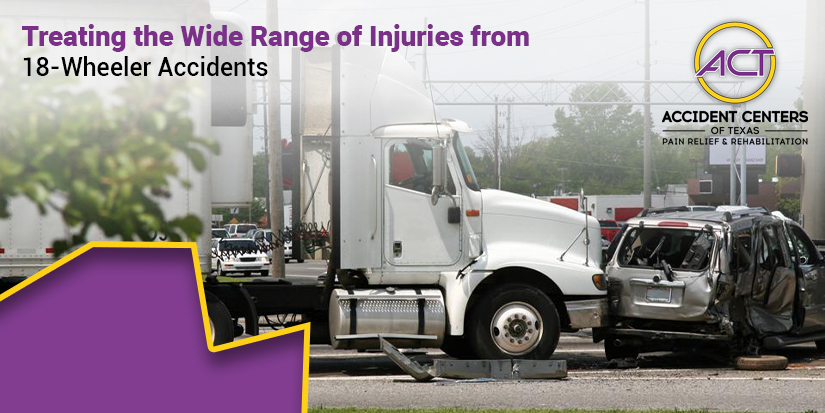18-wheelers, also known as semi-trucks or big rigs, weigh 20-30 times more than passenger vehicles. Their massive size and weight make them extremely difficult to maneuver and bring to a halt.
So when an 18-wheeler collision occurs, the damage inflicted tends to be much more severe compared to regular car crashes. Even relatively minor trucking accidents can leave victims dealing with acute injuries and long-term medical problems.
At Accident Centers of Texas, our team of skilled physicians and rehab specialists has extensive experience treating the various types of traumatic injuries stemming from 18-wheeler and truck wrecks.
As soon as you become our patient, our doctors start by evaluating your condition fully through diagnostic tests, scans and thorough examinations. This helps determine all the bodily trauma you have faced precisely – from obvious surface wounds to deeper-rooted issues.
Armed with these insights on the source, nature and intensity of damage, we customize flexible treatment plans catering to your unique physiology and recovery needs.
Common Injuries from 18-Wheeler Accidents
Typically, large truck accidents lead to a host of damages extending across the head, neck, chest, spine, limbs and other critical areas of victims. Some of the more common severe to catastrophic injuries we aggressively treat include:
Whiplash & Neck Injuries: Sudden jerking motions when an 18-wheeler rear-ends a vehicle can inflame muscles or tendons in the neck, damaging cervical vertebrae and discs. Whiplash is an acute condition causing immense neck pain, stiffness, headaches and lost mobility. If left unaddressed, chronic pain can persist for years.
Spinal Injuries: The incredible force of a semi-truck collision transfers vertically along the spinal column, often compressing, fracturing or even severing delicate nerve roots. This induces partial or total paralysis, loss of sensation, intense neuropathic pain and permanent disability. Spine trauma requires immediate surgery in many cases to prevent worse outcomes. Our orthopedic experts utilize state-of-the-art minimally invasive spinal procedures when needed.
Traumatic Brain Injuries (TBIs): Brains literally get thrown against the walls of skulls during the violent motions of a truck accident. This bruising, internal bleeding and swelling cuts off vital oxygen supply, killing neurons. Our doctors treat dreadful TBIs including severe concussions, hemorrhages, amnesia, delirium and even long-term neurodegeneration in the form of dementia.
Broken Bones & Fractures: The extreme G-forces within a swerving, out-of-control semi can easily crack through bone – be it ribs, arms, hips or legs. Compound or penetrating fractures with bone protruding through skin bring high risk of infection too. Our orthopedic specialists set dislocated joints and stabilize shattered bones using casts, pins or plates so they heal correctly.
Soft Tissue Injuries: Truck crashes also commonly dislocate joints or damage ligaments, tendons and cartilage. Our physicians provide nonsurgical remedies easing the agony by treating areas like the back, knees or shoulders through customized physical therapy, non-opioid pain reliefs, steroid injections, massage and more.
Additionally, the post-accident trauma anxiety, stress or depression plaguing most patients receives compassionate behavioral and medication-based therapy from our mental health experts.
Holistic & Integrated Care
As evident from the wide-ranging injuries discussed, specialized rehabilitative treatment is pivotal not just for recovery but also restoring quality of life. Our multidisciplinary medical team works in close collaboration, ensuring coordinated care based on your unique challenges.
Orthopedic experts repair bone damage through surgery or external stabilizers. Neurologists address complex concussion after-effects and muscle weakness via stimulation techniques. Internal medicine specialists treat internal organ bruising and bleeding with tube drainage or drugs preventing sepsis. Pain management doctors enable functioning by strategically alternating therapies to avoid medication overuse.
Simultaneously, physical and occupational therapy helps rebuild strength, flexibility and mobility. Psychology services tackle the invisible emotional scars accidents leave behind. Home healthcare assists in adapting houses for accessibility. Support groups create communities, reminding victims they aren’t alone.
With holistic, integrated treatment customized to address your whole health across body and mind, our 18-wheeler injury doctors put you on the road to optimal recovery.







